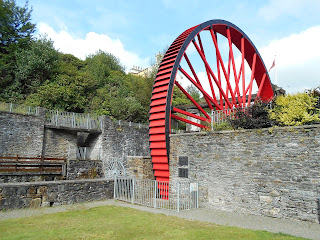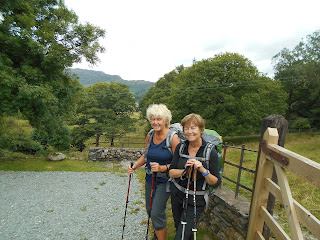I awoke to a blue sky in Douglas, with not even a cloud in sight,
and a perfect day to travel to the highest point on the Isle of Man – Snaefell,
a “mountain” topping out at 2,036 feet. As I did yesterday, I took the Electric
Railway to Laxey, but this time rather than continue on to Ramsey, I changed
cars at the Laxey station to the one that goes to Snaefell. On the ride from
Douglas to Laxey, I asked the conductor about the train system. According to
him, the tracks were laid in 1893, solely for the tourist trade, although now
used by locals for short trips. All of the cars presently in use date from 1893
or 1895, except for the newest which went into service in 1918.
Many people had the same idea that I did, to wit: go to
Snaefell in good weather. As a result, the one-car tram to Snaefell couldn’t
accommodate everyone who arrived from Douglas. I wasn’t in any hurry, so
deferred to the next tram. My decision was based in no small part on the
conductor’s report that the summit was in cloud, but expected to clear.
That gave me an extra 30 minutes at the Laxey train station
which I used to explore another historic site, the Laxey Water Wheels. Laxey is
a former mining town, and large water wheels powered by a flowing creek were
used to pump water from the mines. The current wheels have been nicely
refurbished to demonstrate their historic function.
The ride up to Snaefell was in sunshine, but upon
disembarking we were hit by 40 mph cold winds and blowing clouds. There was no view. Most
passengers headed immediately for the shelter of the restaurant and ordered
warm drinks. I braved the short walk to the summit to get a picture of my
hiking poles at the trig point. It was too windy for me to bother removing them
from the pack, so I placed my pack at the trig point, with no little
trepidation that it might blow off the mountain.
View from summit
An old Spitfire sits near the summit. One could create a
romantic story about the pilot heroically landing there during a storm, but in
reality it was donated to the people of the area, who brought it up by the
railway.
Everybody took the next trolley down, except for those still
nursing their coffees. Within twenty minutes we reached the Laxey station where
warm, sunny weather induced most passengers to have an ice cream and induced me
to walk to through Laxey to the seashore. Except for a short interval on the
summit of Snaefell, the day was as lovely as I had anticipated it would be.
 |
| Shoreline at Laxey |


























